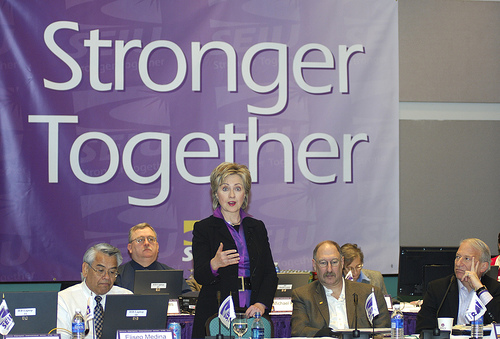Blueprint for a Tory National Security Reform
As President Elect Obama and his new foreign policy team contemplate how to deal with the growing number of security challenges that will confront them on Inauguration Day, a bi-partisan group of experts has tabled a series of thought-provoking ideas for how to reform the U.S government.
The report from the Project on National Security Reform (PNSR) shows the U.S national security establishment at its finest – willing to think far into the future, push creative ideas and suggest the reorganization of vast swathes of government. (Full disclosure: I served pro bono as an adviser to the team). It stands in sharp contrast to Gordon Brown’s timid reforms, outlined a few months ago in the now-forgotten National Security Strategy. In fact, the report is veritable smorgasbord of ideas that any up-and-coming Tory security specialist should pick from.
The first recommendation, which a Conservative Party ought to consider when they take office – and legislate to repeat with every new Parliament — a National Security Review, which should prioritize objectives, establish risk management criteria, specify roles and responsibilities for priority missions, assess required capabilities, and identify capability gaps. This would go well beyond both the traditional Defence Reviews, as it would take in all of governments, and leave the National Security Strategy to elaborate on strategy and policies rather than being the hotchpotch of policies and reform proposals that it currently is.
To implement this, the U.S report suggests National Security Planning Guidance, to be issued annually, in order to provide guidance to departments based on the results of the National Security Review. This, too, would make sense in Britain where the National Security Strategy has not been able to force any change in the way departments operate because it never moved into specific requirements.
In Britain, such a document would have to be tied to the Budget and preferably the Comprehensive Spending Review. But with a National Security Planning Guidance, the Treasury and other Departments will be able to draft multi-year resource plans for each department and ensure consistency with the National Security Review. Perhaps a part of a future Comprehensive Spending Review would by a National Security Resource Document, which could contain which presents the government integrated, rolling six-year national security resource strategy proposals.
The report suggests that a Presidential Security Council replace the National Security Council and Homeland Security Council, thus removing an artificial divide. In many ways, the Brown government foresaw this development with the creation of a Cabinet Committee on National Security, International Relations and Development. But the establishment of a cross-government committee was not accompanied by reforms of the Cabinet Office and so did not create anything resembling the U.S set-up. In fact, the last couple of years have seen a well-reported hallowing out of the Cabinet Office.
Adapting from the U.S report, the Conservative Party should look at ways to adapt the idea of a Director for National Security, who would work to the National Security Adviser and manage the Whitehall decision-making process. This would allow the Prime Minister to appoint a political National Security Adviser –- like Pauline Neville-Jones -– but have a Civil Servant manage the bureaucratic work. The Cabinet Office would have to be considerably expanded with permanent staff covering key countries and issues. Decision-making would still have to lie with Ministers and Cabinet, but the fact that modern policy-making require a stronger center is recognized by everyone except the current officials in the Cabinet Office.
I would add the idea of having Prime Ministerial Regional Envoys or in the cases where Britain has a large-scale, multi-departmental commitment, like Afghanistan, Resident Ministers, such as Harold Macmillan’s role in Austria, Duff Coooper’s in Singapore and Oliver Lyttelton’s in Cairo during World War II. These individuals would have the clout to manage all departmental interests, have a direct link to Parliament (and so could keep the arguments for interventions alive) and ensure the necessary delegation of authority. Their constituency duties could be dealt with like the Speaker’s. Now that I’m thinking about the subject, I’d add the previously-floated ideas of upgrading the UK military representative in the U.S to a Deputy Chief of the Defence Staff akin to John Dill’s role during WW II.
To get the right kind of people supporting missions, the report recommends a National Security Professional Corps and a National Security Strategic Human Capital Plan to identify and secure the human capital capabilities necessary. Here too the Conservative Party should take note. Though there are Arabists in the Foreign Office and micros-finance specialists in DfiD, Britain does not really have a cadre of national security professionals. And why not? National security work is, after all, the most imrpotant kind of work and now cuts across all departments so it makes sense to create a career-path and incentives for people.
As changes cannot only happen in the Executive branch. The report therefore recommends the establishment of Select Committees on National Security in the Senate and House of Representatives. This, too, makes sense in Britain where the various Select Committees tread on each others toes, and fail to provide oversight of cross-department issues. A Lords/House Select Committee on National Security seems like a good idea.
The next election will not be fought on defence policy and few have been won on the strength of bureaucratic reforms. But the Tories will need to have serious ideas ready if they hope to change the country’s foreign and security policy. This U.S report shows how it can be done.

